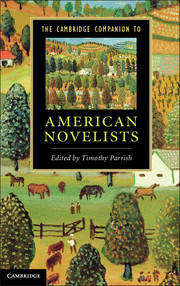Book contents
- Frontmatter
- Contents
- Contributors
- Introduction
- 1 James Fenimore Cooper
- 2 Nathaniel Hawthorne
- 3 Herman Melville
- 4 Harriet Beecher Stowe
- 5 Mark Twain
- 6 Henry James
- 7 Edith Wharton
- 8 Theodore Dreiser
- 9 Willa Cather
- 10 F. Scott Fitzgerald
- 11 Ernest Hemingway
- 12 William Faulkner
- 13 Henry Roth
- 14 Djuna Barnes
- 15 Zora Neale Hurston
- 16 Richard Wright
- 17 Raymond Chandler
- 18 Ralph Ellison
- 19 J. D. Salinger
- 20 Patricia Highsmith
- 21 Vladimir Nabokov
- 22 Jack Kerouac
- 23 Saul Bellow
- 24 Kurt Vonnegut
- 25 John Updike
- 26 Thomas Pynchon
- 27 Toni Morrison
- 28 Philip Roth
- 29 Don DeLillo
- 30 Cormac McCarthy
- Guide to Further Reading
- Index
- References
15 - Zora Neale Hurston
Published online by Cambridge University Press: 05 December 2012
- Frontmatter
- Contents
- Contributors
- Introduction
- 1 James Fenimore Cooper
- 2 Nathaniel Hawthorne
- 3 Herman Melville
- 4 Harriet Beecher Stowe
- 5 Mark Twain
- 6 Henry James
- 7 Edith Wharton
- 8 Theodore Dreiser
- 9 Willa Cather
- 10 F. Scott Fitzgerald
- 11 Ernest Hemingway
- 12 William Faulkner
- 13 Henry Roth
- 14 Djuna Barnes
- 15 Zora Neale Hurston
- 16 Richard Wright
- 17 Raymond Chandler
- 18 Ralph Ellison
- 19 J. D. Salinger
- 20 Patricia Highsmith
- 21 Vladimir Nabokov
- 22 Jack Kerouac
- 23 Saul Bellow
- 24 Kurt Vonnegut
- 25 John Updike
- 26 Thomas Pynchon
- 27 Toni Morrison
- 28 Philip Roth
- 29 Don DeLillo
- 30 Cormac McCarthy
- Guide to Further Reading
- Index
- References
Summary
Zora Neale Hurston (1891–1960) was a natural born storyteller, whose capacity for the southern rural black vernacular can be compared to Mark Twain’s for the southern rural white vernacular. In her best-known work, Their Eyes Were Watching God (1937), she provides an intimate portrait of early twentieth-century black southern rural life via the personal story of a young woman whose quest for love leads her instead to self-knowledge. Hurston’s protagonist, Janie Crawford, has become one of the best-known heroines in American literature, whose internal quest can be compared to that of Kate Chopin’s Edna Pontellier of The Awakening (1899). Certainly, the central black woman’s quest narrative in Their Eyes served as inspiration for Gwendolyn Brooks’s title character in Maud Martha (1953), the women in Ntozake Shange’s for coloured girls who have considered suicide when the rainbow is enuf (1975), Alice Walker’s Celie in The Color Purple (1985), and indeed a variety of subsequent characters in the works of authors from Toni Morrison to Alice Randall and Sister Souljah. Their Eyes was bold and audacious for its time. Hurston broke with black literary establishment prescription and told a story about working-class southern rural black folk living their everyday lives (warts and all), about a woman for whom sexual pleasure was an important aspect of marriage, and finally about a woman whose self-identity was ultimately not tied to marriage. Time and again in her work, Hurston explores (with a rare honesty) the complexities of gender role expectations in heterosexual relationships. Though her attention to women’s lives makes her part of feminist literary history, Hurston was a staunch individualist who was politically conservative. She faced harsh criticism from black critics as well as from leftist critics – regardless of race. She responded to critics by becoming even more conservative, an orientation that increasingly marginalized her in black literary circles. Richard Wright, Ralph Ellison, and W. E. B. DuBois all expressed public disapproval of her and her work for a variety of reasons.
- Type
- Chapter
- Information
- The Cambridge Companion to American Novelists , pp. 146 - 155Publisher: Cambridge University PressPrint publication year: 2012



